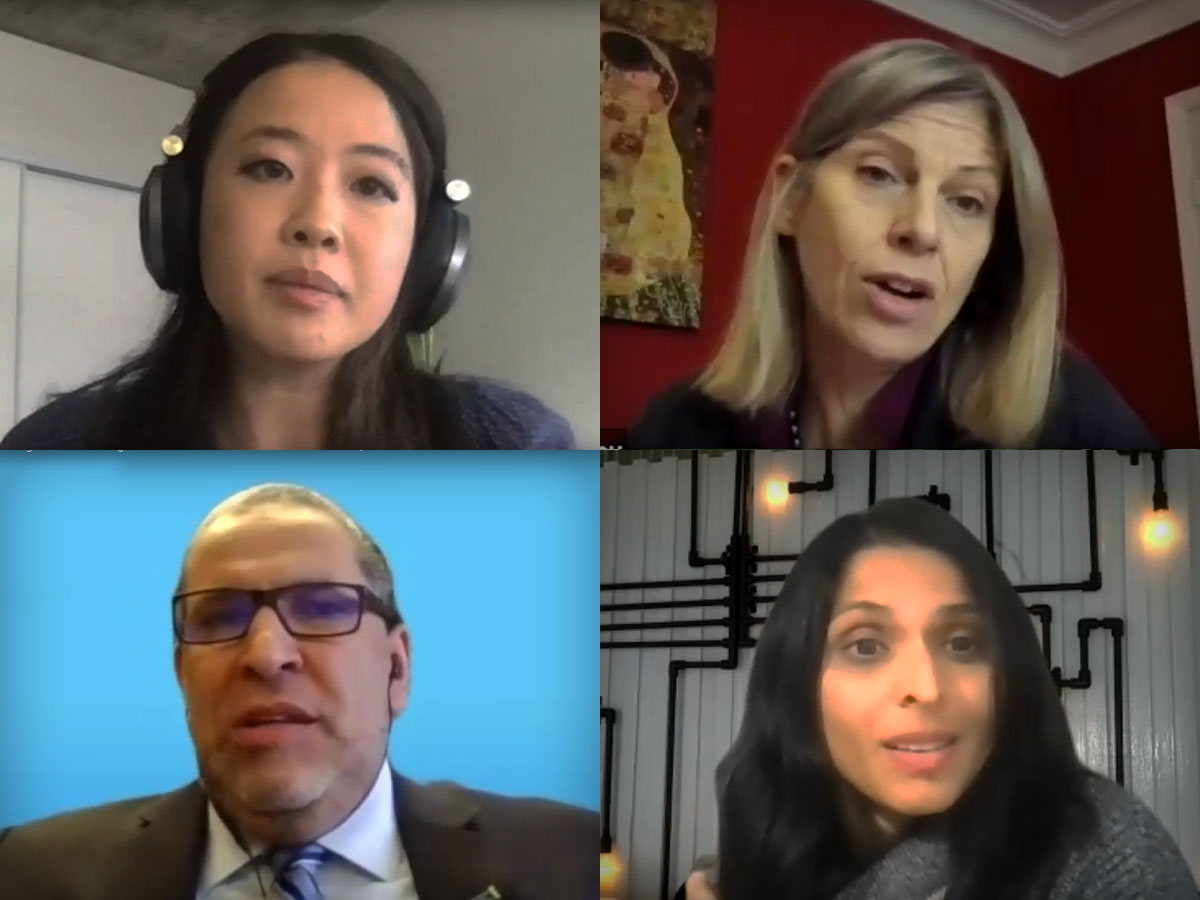Ryerson hosts conference on future of migration and work

Laura Lam (top left), Anna Triandafyllidou (top right), Mohamed Lachemi (bottom left) and Rupa Banerjee (bottom right) were among the Ryerson speakers at the Migration and the Future of Work: Canadian and Comparative Perspectives in Pandemic Times conference.
Hundreds of researchers from around the world gathered virtually for the Migration and the Future of Work: Canadian and Comparative Perspectives in Pandemic Times conference. Between February 22 and 25, 2021, attendees discussed the impact of COVID-19 and the changing nature of the global labour market.
The conference was hosted by professor Anna Triandafyllidou, Ryerson’s Canada Excellence Research Chair (CERC) in Migration and Integration. During her opening remarks, professor Triandafyllidou said the topic “future of work” was already under consideration for this year’s conference prior to the pandemic declaration, but as the global health crisis continued, it became clear that COVID-19 would have a significant impact on work and migration.
Ryerson president Mohamed Lachemi said the topic was particularly relevant to the university due to the pandemic-related challenges faced by international students. He explained that the CERC program is bringing together researchers, student scholars, policy makers and industry leaders to better understand migration and immigration.
“As we endure a global pandemic, that mission takes on a new significance. We’re determined to do all we can to assist in the global economic recovery from COVID-19,” said president Lachemi, adding that the talent of migrants needs to be integrated into the recovery process.
The future of the Canadian economy
The conference kicked off with a roundtable chaired by professor Triandafyllidou, focusing on the future of the Canadian economy and migration, particularly post pandemic. Senior figures from BMO Financial Group, Paramount Fine Foods, Deloitte and the Organisation for Economic Co-operation and Development (OECD), explained how immigration will be important for Canada’s economic future and that organizations must pursue equity outcomes. The conference also heard that Canada is unique in including migration as part of the economic recovery program for COVID-19.
Comparative points-based systems
In a session about points-based systems for migrant selection, Ryerson professor Rupa Banerjee highlighted her research into Canada’s express entry application stream. “Express entry tries to combat the sources of immigrant disadvantages in a number of ways,” she said, noting that there is early evidence of positive impacts on unemployment rates and relative earnings of newcomers. However, she said concerns remain about how demands for “soft skills,” such as workplace fit or language proficiency, can cause barriers. Professor Banerjee noted that the express entry program in particular doesn’t address the Canadian labour market’s need for lower-skill workers.
Research on the gig economy
On the third day of the conference, Ryerson speakers presented findings from their research into the ways in which immigrants engage with the gig economy. Karen E. McCallum, a senior research associate at the Diversity Institute and the Future Skills Centre, discussed her work into the demographics and characteristics of gig workers in Canada. Among the outcomes of her research was the finding that new immigrants are over-represented in the most precarious and least well-paid gig work jobs. McCallum explained that this was likely a result of barriers that immigrants face in securing more traditional types of employment.
“While there are many more Canadian-born people doing gig work in terms of numbers of people, there’s a much higher proportion of the overall immigrant population doing gig work,” she said. “We can also see that gender matters here… For women, there’s a higher degree of economic benefit from gig working.”
Professor Triandafyllidou and researcher Laura Lam, from Ryerson’s CERC in Migration and Integration program, presented their research into the stories of immigrants who are using digital platforms to secure gig work. Using interviews with newcomers to Canada, the researchers were able to establish some of the positive and negative aspects of working in the gig economy. Some participants said that these jobs were stepping stones into more secure work and were the best option available without prior Canadian work experience, but others explained that the jobs could also be dead ends.
“We are seeing very qualified, educated individuals coming to Canada facing these challenges,” said Lam. “The barriers that migrants are facing here… really highlight how platform work becomes so much more attractive.”
Are global migration agreements future-ready?
The conference closed with a roundtable discussion about the ability of international agreements to meet the latest global challenges, featuring experts from the Migration Policy Institute, Erasmus University Rotterdam, the OECD and the National University of Singapore. The speakers said that many agreements needed to be adapted to address current issues like climate change, inequality, remote working, stalled migration caused by the pandemic and advances in technology.
Professor Triandafyllidou’s seven-year CERC program is leading investigations into a wide array of issues associated with global migration, including international governance, integration policies and multiculturalism. The program provides a vital link between Canadian and international experts to address the future challenges facing Canada and the world.
Related links:
Learn more about the Canada Excellence Research Chair in Migration and Integration.
Read a summary of the Ryerson CERC program’s 2020 conference.